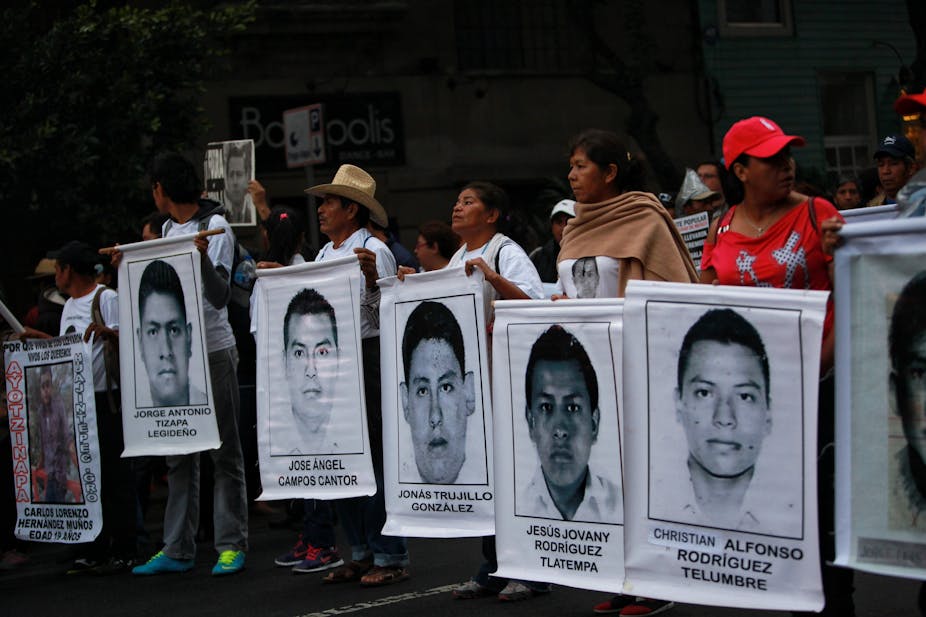After days of national and international scorn, Mexican authorities finally released 11 persons who were arrested during protests against the disappearance of 43 students in September. President Enrique Peña Nieto has announced an overhaul of local policing in response to the protests, but they have been largely met with scepticism.
After a traumatic two months, Mexican people’s patience with the country’s dire situation is at an all-time low.
And no wonder. The violence that has spread across Mexico since 2006 has deep roots in old social injustices, but has been badly aggravated by more recent neoliberal reforms that left the economy stagnant. High levels of poverty and inequality and the corruption of the political and judicial systems collided with external forces – in particular the supply of weapons and demand for drugs from the US – to trigger an unprecedented and intractable crisis that shows no sign of stopping.
Although crime and violence have affected virtually everyone in the country, the greatest suffering has been felt in rural and indigenous communities, among Central American migrants crossing the country on their way to the US, and in poor urban neighbourhoods. Thanks to institutionalised inequality and corruption, these people are marginalised and socially all but invisible. The violence they endure comes not only at the hand of criminal gangs and drug cartels, but also from political institutions and state authorities themselves.
It was against this backdrop that the affair of the murdered students kicked off.
Low ebb
On September 26 2014, a group from a rural teacher-training college from town of Ayotzinapa were attacked by the police when they apparently disrupted a political event in Iguala, in the state of Guerrero.
Six people were killed by the police during the attack; 43 students then disappeared after they were arrested. The running assumption is that they were handed over to local drug bosses, with whom the mayor and his wife had strong ties. The government embarked on a search for the 43 missing students, but turned up nothing for more than two months.
According to Amnesty International, the response has been “biased and incomplete, failing to challenge the entrenched collusion between the state and the organised crime which underlies these grave human rights violations.”
To make matters worse, the search uncovered a number of clandestine mass graves in the surroundings of Iguala, unearthing dozens of unidentified bodies of people that had gone missing before but whom the authorities had never looked for.
These are not isolated events. On the contrary, they mirror the nightmarish situation in many parts of the country – which demonstrates just how corrupt and incompetent the state’s actions to fight crime and violence have been ever since the crisis began.
Paralysis
According to official statistics, close to 95% of all crimes in Mexico are never investigated by the police. In less than ten years of prolonged violence, more than 120,000 people have been killed, while more than 25,000 have gone missing.
The scale and intensity of the violence has paralysed Mexican society – but the brutal events of recent weeks have finally awakened it.
The 43 missing students have become a symbol of society’s struggle for peace and justice. Demonstrations have been spreading for several weeks across the country. In a nation of deep historic social and regional divisions, it’s very stirring to see people from all social classes and regions marching together to demand action from their government.
On November 20, the country saw some of the largest demonstrations in its recent history, the very same day that the start of the Mexican Revolution is commemorated, the 10 year struggle for justice and equality that began in 1910. Hundreds of thousands of people took to the streets across the country, and in many cities around the world, demanding an end to violence and corruption by both criminals and the state.
Events are still unfolding, and exactly how Mexico’s authorities will handle the uprising remains to be seen. One crucial thing is for the state to avoid any violent repression. Illegally detaining 11 people after the recent protests and sending them to maximum security prisons took them dangerously close to a full-blown crackdown.
In the meantime, the unprecedented mobilisation of Mexican citizens confirms that, as in the revolution of more than a century ago, the majority of Mexicans firmly believe that only a society thoroughly rebuilt to be more just and equal will bring them the peace and safety they deserve.
Viviana Ramirez and Oscar Garza, PhD candidates in Social and Policy Sciences at the University of Bath, contributed ideas to this article.

